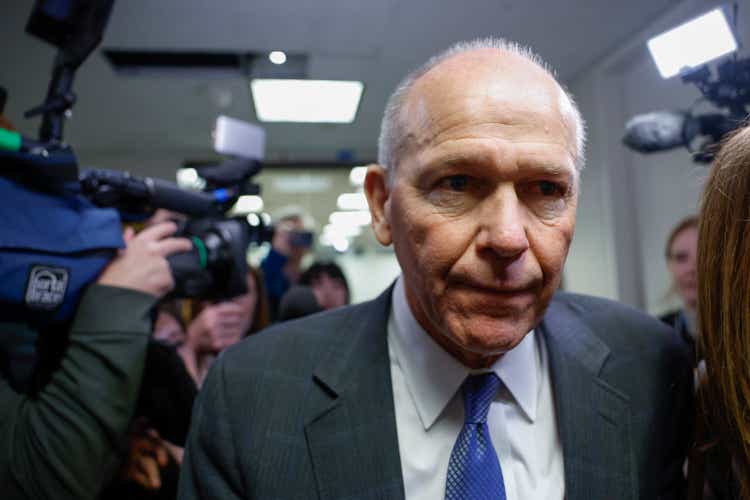Summary:
- Boeing’s top boss Dave Calhoun plans to step down at the end of the year.
- Mizuho turns cautious on the EV sector, downgrades Tesla, Rivian, and Nio.
- Look beyond the Magnificent 7 to the GRANOLAS in Europe – Goldman Sachs.
Anna Moneymaker/Getty Images News
Listen below or on the go on Apple Podcasts and Spotify
Dave Calhoun announces sets a date to leave amid safety struggles. (0:15) Mizuho turns sour on EV stocks. (2:36) Like the Magnificent 7? Try the GRANOLAS. (4:53)
This is an abridged transcript of the podcast.
Our top story so far
Boeing (NYSE:BA) President and CEO Dave Calhoun plans to step down at the end of the year.
Board Chairman Larry Kellner informed the board that he won’t stand for re-election at the upcoming annual shareholder meeting. The board elected Steve Mollenkopf to succeed Kellner as independent board chair. In this role, Mollenkopf will lead the board’s process of selecting Boeing’s next CEO.
Stan Deal, president and chief executive of Boeing Commercial Airplanes, will retire from the company and be succeeded by Stephanie Pope starting Monday. Pope was chief operating officer previously.
The managerial changes come as Boeing grapples with significant safety issues and intense scrutiny from aviation authorities. The midflight emergency on a 737 Max 9 flown by Alaska Airlines (ALK) in early January led to the FAA capping the company’s output of some planes until it improves its safety culture.
Calhoun said: “As you all know, the Alaska Airlines Flight 1282 accident was a watershed moment for Boeing. We must continue to respond to this accident with humility and complete transparency. We also must inculcate a total commitment to safety and quality at every level of our company.”
In today’s trading
Stocks are on the back foot, but only down slightly following the best weekly performance for the S&P 500 (SP500) in 2024.
Clark Bellin, president and CIO of Bellwether Wealth, based in Lincoln, Nebraska, says, “The stock market has seen a fast and steep climb so far this year, and the Dow Jones Industrial Average is closing in on its next milestone of 40,000, which is a psychologically important threshold for the market.”
“The market could continue to move higher, albeit likely at a slower pace, if earnings hold up and the market’s highs encourage cash sitting on the sidelines to enter the market.”
In economic indicators, February New Home Sales slipped 0.3% M/M to 662,000 vs. 675,000 consensus and revised 664,000 prior. On a year-over-year basis, new home sales rose 5.9%. The median sales price of new houses sold in February dipped to $400,500.
Oliver Allen, economist at Pantheon Macro, says: “The marginal decline in new home sales is a bit disappointing, coming after two straight monthly increases and the surge in existing home sales in February, although it is in keeping with the stalling of the recovery in mortgage demand over the past month or two.”
Among active stocks
Mizuho Securities has turned cautious on the electric vehicle sector due to near-term demand issues and tightening liquidity concerns. The firm also warned on increasing inventory levels that could create yet another pricing headwind this year.
Mizuho downgraded Tesla (TSLA), Rivian Automotive (RIVN), and Nio (NIO) to Neutral ratings after having them all at Buy. Analysts cut the price target on Tesla to $195 (14% implied upside), lowered its PT on Rivian to $12 (11% implied upside), and dropped its PT on Nio to $5.50 (12% implied upside).
J.P. Morgan started coverage on Super Micro Computer (SMCI) with an Overweight rating and a price target of $1,150.
Analyst Samik Chatterjee says: “We expect the leadership to continue, led by a balance of custom-built solutions and fast time to market, although potential upside is more likely from rapid expansion in the AI Server market rather than expansion of the already premium valuation multiple.”
And Match Group (MTCH), owner of dating apps such as Tinder and Hinge, has added two members to its board of directors after talks with activist investor Elliott Management. Laura Jones, Chief Marketing Officer of Instacart (CART), and former Zillow (ZG) Chief Executive Spencer Rascoff will join the company’s board, effective immediately.
In other news of note
Asset managers are increasingly converting mutual funds to ETFs. There have been more than 70 mutual fund-to-ETF conversions in the U.S., and asset managers expect this number to rise further over the next year.
The latest is PIMCO, which proposed its first mutual fund-to-ETF conversion this year. PIMCO is weighing the conversion of its Mortgage-Backed Securities Fund from a mutual fund into an ETF.
Pimco’s mutual fund offerings saw $2.1 billion inflows for the year ended January 31, according to Morningstar data, while its ETFs recorded $3.9 billion of inflows.
Peter Shea, co-head of ETF practice at law firm K&L Gates, says that behind the trend is “growing interest in active strategies since 2021 and the regulatory latitude granted to reorganizations of financial products into ETFs since 2019.”
And in the Wall Street Research Corner
Goldman Sachs says it’s time to look beyond the Magnificent 7 and think about going long the GRANOLAS in Europe.
While a much less cool name, the GRANOLAS offer the same heft in driving broader market returns with less volatility. The realized volatility of the GRANOLAS is on average 2x lower than for the Magnificent 7.
The stocks are GSK (GSK), Roche (OTCQX:RHHBY), ASML (ASML), Nestle (OTCPK:NSRGY), Novartis (NVS), Novo Nordisk (NVO), L’Oreal (OTCPK:LRLCF), LVMH (OTCPK:LVMHF), AstraZeneca (AZN), SAP (SAP), and Sanofi (SNY).
Chief Global Equity Strategist Peter Oppenheimer says: “The GRANOLAS trade on a similar valuation to the S&P 500 but with stronger (and perhaps more stable) growth.”
They are reinvesting at a high rate, which will allow them to compound earnings over time, with the last five years’ growth investment ratio at 55%, close to that of the 59% for the Magnificent 7, he added.

